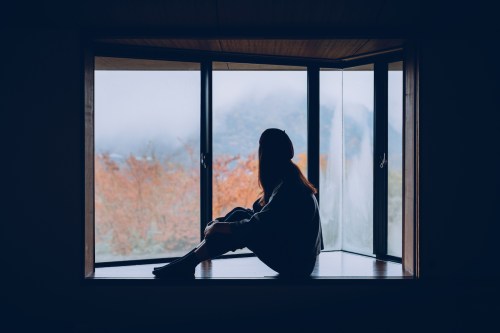3 tips to get out of survival mode and find comfort in the abnormal, according to a psychotherapist
Here's how to get out of survival mode, according to a therapist because it's time to adjust to a new normal, as best as you can.

Some days, as of late, I feel like I’m living in a zombie-apocalypse video game, because that feels more plausible than actually needing to dodge an invisible infection as I race through the grocery store for staples like eggs and milk. Unfortunately, it’s not fake news or a game, and I feel validated in once-mundane errands now sending my brain into a wave of anxiety. But, it’s time for me (and perhaps you) to learn strategies that will allow for hitting pause on this non-game by learning how to get out of survival mode.
“Often when we find ourselves in a situation where we feel out of control, or something unexpected happens, we fall into ‘survival mode,'” says psychotherapist Jennifer Teplin, LCSW. “This mode can be different for everyone but it’s the place where your mind shuts down and focuses on one task: survival.”
And survival is, to be clear, the most crucial component of getting through this COVID-19 crisis. But survival mode itself is meant to be extremely temporary—a biological response intended to push us through high-stress situations. And we’re living through a high-stress situation for sure, but how temporary it is remains unclear, so knowing how to get out of survival mode is important for being able to deal as best as we can.
“[Survival mode] can be beneficial, but this can also keep us from falling back into a normal step in life.” —psychotherapist Jennifer Teplin, LCSW
“[Survival mode] can be beneficial, but this can also keep us from falling back into a normal step in life,” says Teplin. “For the first few days [of social distancing], survival mode absolutely made sense. We had no idea what was going on, what to expect, who was infected, and so on.” But now, she adds, we can see a bit clearer what appears to be a new temporary normal, so it’s important to begin to settle into a routine that feels sustainable and also satisfies guidelines set by the Centers for Disease Control and Prevention (CDC).
Well, great—but easier said than done, right? Below, get Teplin’s top three tips for how to get out of survival mode and into a temporary routine that works for this current time in life.
1. Create a daily routine for yourself
Routines can be stabilizing and provide a sense of regularity when it feels like most other things are totally abnormal. But finding a new routine during this time doesn’t mean you have to—or even can—do a million tasks in order to stay busy. Rather, try and identify small, passive joys of your regular life that you can edit to fit the current climate.
“Think of what you did before, during, and after work to remain on pace and in a good mind-set,” says Teplin. “Try to rework your daily routine so that it complements your new style of living.”
For example, I was in such a bad way during my first few days of self-quarantine: nothing but sleep, sweat, hand-washing. Finally, I put on my favorite Go-Go’s record and realized I hadn’t listened to music all week because I’m not commuting to an office any longer. So now, I’m trying to replicate that former unconscious daily ritual of listening to music; it’s free, simple, and, as a bonus, now it lacks a dreary commute on the New York City subway.
2. Integrate conversations with positive people into your life
“Touch base with those who support you and make you feel grounded,” says Teplin. And if that directive sends you into a panic spiral because you feel like you haven’t been doing much else other than video-chatting with your social circle, I totally get it. The constant demand for screen time from others can be draining, especially if you’re an introvert living in isolation.
But certain ground rules can help ease this burden. For starters, commit to having conversations that don’t revolve around COVID-19. Three long doom-centric dialogues don’t serve you as well as making a gratitude list with someone level-headed or, hell, even taking a five-minute break from whatever you’re discussing to talk about something joyfully petty.
3. Check in with yourself periodically to see how you’re feeling
Everything is so absolutely fast-paced about this crisis, so make sure that you take a moment each day to really search your feelings and tend to what your body and mind need.
“Slow down, remove the army garb, and ask yourself how you’re doing, and what you need,” says Teplin. And don’t feel like you can’t ask for help from your community of loved ones or a professional.
Missing your favorite gym right now? We’re keeping tabs on the best online workouts to fit into your schedule. And incorporating some of these 10 daily habits can keep you feeling human.
Sign Up for Our Daily Newsletter
Get all the latest in wellness, trends, food, fitness, beauty, and more delivered right to your inbox.
Got it, you've been added to our email list.










